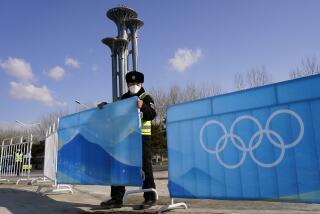Traveler Breaks Through a Great Wall : THE RIVER AT THE CENTER OF THE WORLD: A Journey Up the Yangtze, and Back in Chinese Time by Simon Winchester; Henry Holt $27.50, 410 pages
- Share via
Halfway up the Yangtze with Simon Winchester, I realized I was learning a lot of Chinese history. I was also getting a feel for the realities of contemporary China.
Once taken in hand, this book is hard to turn away from. Winchester, a seasoned writer with long experience in China, has hit another home run for British travel writers, who have dominated the travel-writing game for generations. They have in their fingertips an unerring knowledge of the exact mixture of personal observation, historical lore and psychological insight that can make a journey a deeply satisfying adventure.
So it is with Winchester’s Yangtze. In one sense, it is a meditation on the deep continuities of 5,000 years of Chinese history; in another, a frank sketch of some of the jarring tendencies of modern communist China.
Winchester’s Chinese is quite poor, so he has taken along Lily, a young bilingual Chinese woman of formidable height and tongue. She uses the latter to lash into submission the government officials who at every turn seek to block their progress and their inquiries. To avoid reprisals against her, Winchester alters both her name and her identity.
In Zhenjiang, they go to Pearl Buck’s house. It sits behind a high barbed-wire fence with a plaque identifying it.
“The house was shut, naturally,” Winchester writes. “But a woman lived there and through the wire I managed to persuade her to open both the gate and the front door to the house. ‘But’ she spluttered,--and I knew what was coming next--’her private rooms are locked and’--and both Lily and I joined in the mantra chorus that inevitably followed, as burp follows noodles--’the man with the key is not here.’ ”
But overcoming one obstacle after another, they journey from the lightship at the mouth of the river to its sources 3,900 miles away in the high plateau and mountains of Tibet.
Winchester’s descriptions of the river itself are vigorous. Of its power, when on the upper reaches it is squeezed between high mountain walls and is descending fast, he writes:
“In places like these the water is not so much water as a horrifying white foam--a cauldron of tortured spray and air and broken rock that is filled with the wreckage of battered whirlpools and distorted rapids and with huge voids of green and black, the whole maelstrom roaring, shrieking, bellowing with a cannonade of unstoppable anger and terror.”
There are revealing chapters on Shanghai, China’s largest city; on the importance of Mao Tse-tung’s swims in the river; on Nanjing (Nanking), former capital, in 1937 the site of Japan’s perhaps most terrible rape, torture, murder and medical “experimentation” of the whole terrible war; on how the British pushed opium on the Chinese and ruined the Chinese tea industry by building their own in their colonies.
Winchester shows how the pride of this ancient nation was unforgettably wounded by the invasions and humiliations at the hands of foreigners in the 19th and 20th centuries.
And he demonstrates persuasively that this pride is the force that drives the construction of the huge and much-opposed Three Gorges dam across the great river.
The Great Wall of China, Winchester says, “had to be built” to save the face of the empire. He calls the dam the second Great Wall.
“Thousands might die in its building, thousands might die in the aftermath,” he writes. “Animals and plants and peoples would be affected in a myriad of strange and appalling ways. An immense section of China would be affected and for the worse. . . . Yet there was no choice here today either. It had to be built, or the new red empire would lose face too.
“Two thousand two hundred years separated the building of the two walls,” he concludes, “two millennia during which the essential nature of China, by this single standard, seemed not to have changed at all.”
More to Read
Sign up for The Wild
We’ll help you find the best places to hike, bike and run, as well as the perfect silent spots for meditation and yoga.
You may occasionally receive promotional content from the Los Angeles Times.





